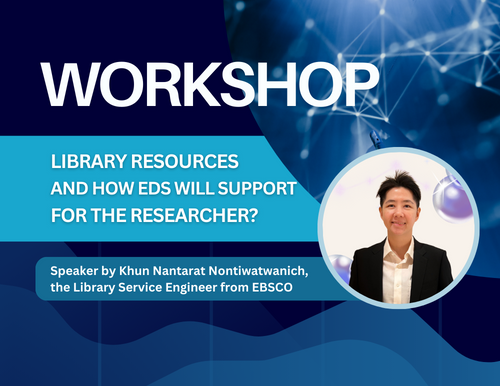The EBSCO database involves searching and accessing high-quality academic articles and research. The steps include targeted searching, reading, downloading, and saving desired articles in the system. Filters and advanced search functions help narrow down results to better match specific needs.
Get inside the customer's mind refers to the process of understanding and empathizing with the thoughts, feelings, preferences, and behaviors of customers or clients. It involves gaining insight into their motivations, needs, and desires in order to better serve them, meet their expectations, and create products or services that resonate with them. By Wichai Pornpratang
การบรรยายเกี่ยวกับ Influencer in Music Marketing ต่อการโปรโมทเพลง และ How to go viral on TikTok โดยคุณการันต์ ตันสุธัยลักษณ์ และคุณศิริภา ผลส่ง และรับชมการแสดงสดกับบทเพลงพิเศษเป็นที่แรก "เธอเองก็เป็นลูกคุณหนูได้นะ" (Meyou x BU) เมื่อวันที่ 28 กุมภาพันธ์ 2567
When you're looking for a job or positioning yourself for career growth, it's important to have an online presence where you can showcase your skills and experience. Your online professional profiles will also help you connect with contacts who can expedite your job search and assist you with moving up the career ladder. By Dr.Orrapavadee Serewittana
This workshop covers advanced searching and the more sophisticated of databases in the EBSCOhost platform. Library Resources, What is EDS and how it works?, Techniques in “Feature & Setting”, How EDS support the researcher. By Nantarat Nontiwatwanich on January 20, 2024
การบรรยายแบบออนไลน์ เรื่อง Data Analytics Trends
โดย Khun Attapon Paknoi, Entrepreneurship and Innovation, Specialist and Researcher, University of London
เมื่อวันที่ 3 มีนาคม 2564
เป็นส่วนหนึ่งของวิชา GI282 Disruptive Innovation ปีการศึกษา 2563
Information from Australian Embassy
Trade and investment in Australia by Mr. Michael Helleman
Study in Australia by K.Pattarin Wirojchoochut
on March 16th, 2022
Nantarat Nontiwatwanich : The Library Service Engineer from EBSCO
ขั้นตอนการทำงานการวิจัย ScienceDirect








